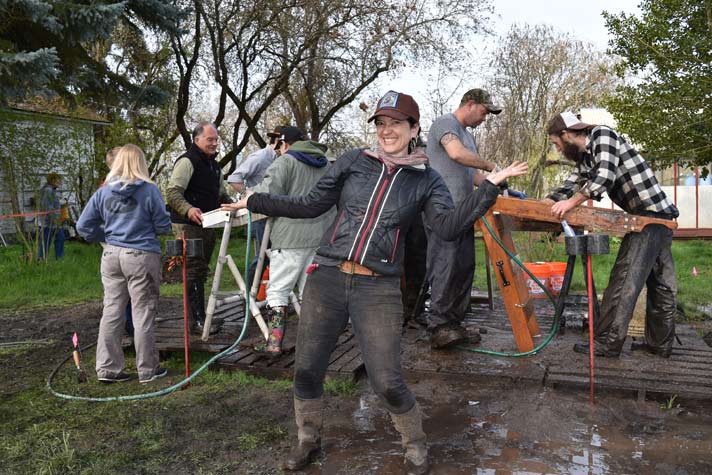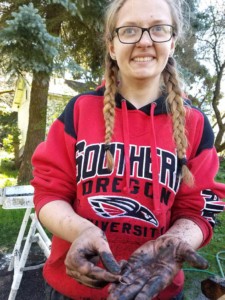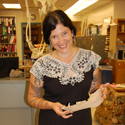Digging Jacksonville – May 2017
It takes a different breed of volunteer, student, and professional, with a burning desire to discover and preserve local history to join an archeology dig. We arrived at Hanley Farm March 31st in unpredictable weather to dig deep into the earth, lift heavy buckets of saturated, compacted mud, and then spray it with hi-power water until nothing remained in the screens except items larger than ¼”. Why do it? To discover and record information of the people and lifestyles of those who lived here prior to current times. Why now?
Chelsea Rose, SOULA staff archaeologist, who gathered a team of this breed of local people, reported, “In anticipation of expanding public facilities and usage, the Southern Oregon Historical Society (SOHS) initiated the archaeologic dig. Because of the variety of volunteers, the dig was completed in four days. SOHS volunteers, students and archaeologists from Southern Oregon University Laboratory of Archaeology (SOULA), and Grants Pass High School, gathered to begin excavation for a new septic holding area and a drain pool.”
Volunteers dug four separate, one-by-one meter, squares, beginning at ten centimeter levels at a time, eventually reaching 5.5’ underground. Chelsea said, “We excavated deeper than the project will need to ensure that the bulk of the archaeology will remain intact after the project.”
“Few of its many visitors realize that Hanley Farm is a significant archaeological site,” says Jeff LaLande, local archaeologist and SOHS trustee. “Native peoples used this area over the course of thousands of years. The recent decision to install a new septic drain system to service the farm presents unusual challenges since construction involves trenching and digging. We’re working together with Oregon’s State Historic Preservation Office (SHPO) and SOULA to ensure that the site’s archaeological values are preserved.” Prior to, and throughout the dig, SOULA consulted with the Confederated Tribes of Siletz Indians, the Confederated Tribes of the Grand Ronde, and the Cow Creek Band of Umpqua Indians.
SOHS board member Greg Applen, feels his involvement from an archaeological perspective is something he can give to the project which will further enhance the future of Hanley Farm, and said, “The project was done in such a timely manner thanks to a variety of volunteers. Water screening all the excavated dirt, allows for the best artifact recovery possible. We excavated a percentage of the anticipated disturbance to mitigate the damage to the site by the project through the scientific recovery of the archaeological data. In total, hundreds of artifacts were recovered, the majority of which will help us better understand the Native American occupation of the area. ”
Greg mentioned his surprise that any of the volunteers returned after their first day of this project. As one of the SOHS volunteers, (with mud splattered from eyebrows to boot toes) it was the thrill of discovery. Not only did I discover tiny flakes from tooled chert glistening through the thick dark mud, but discovered of the diversity of the lives of the project’s team. It left me believing Southern Oregon will always attract people with diverse interests and skills.
Emily Taylor, SOU student majoring in History, who installed the Chinese New Year display at the Jacksonville Library, is a young woman full of surprises. While she shook the tray and I sprayed water, we stared at the dissolving mud. Suddenly Emily made her first exciting discovery. As she beamed, skillfully picking out the tooled chert point, she commented, “When I’ve done installations all of the artifacts come to me clean and tagged. Finding them is exciting.”
Lunch break conversations revolved around Italian and German sword fighting, fire-breathing techniques, and other history projects. Without hands-on team projects, one would never guess the depth of others. Volunteering with interests in a variety of projects builds such community team-building. I live for these ever-changing experiences.
Featured image above is of Chelsea Rose and volunteers at Hanley Farm dig on March 31, 2017.


 Chelsea Rose is an historical archaeologist who specializes in the settlement and development of the American West. Chelsea and the Southern Oregon University Laboratory of Anthropology (SOULA) conduct archaeology across Oregon and have done several projects in Jacksonville. You can reach Chelsea at rosec@sou.edu and follow SOULA on
Chelsea Rose is an historical archaeologist who specializes in the settlement and development of the American West. Chelsea and the Southern Oregon University Laboratory of Anthropology (SOULA) conduct archaeology across Oregon and have done several projects in Jacksonville. You can reach Chelsea at rosec@sou.edu and follow SOULA on